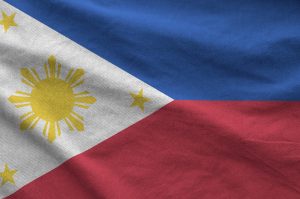Former Philippine President Rodrigo Duterte could face charges of obstruction of justice for covering up the whereabouts of fugitive pastor Apollo Quiboloy, a Philippine lawmaker said yesterday.
On September 8, Quiboloy, the founder of the Kingdom of Jesus mega-church, surrendered to police with four other suspects at his church’s vast compound in the southern Philippines, bringing an end to a months-long manhunt. The 74-year-old faces charges of sexual abuse, child abuse, and human trafficking in Davao City and Pasig City, stemming from complaints filed by former members of his church.
Quiboloy also faces a raft of charges in the United States, including “conspiracy, sex trafficking of children, sex trafficking by force, fraud and coercion, marriage fraud, money laundering, cash smuggling, and visa fraud.”
Notably, Quiboloy was also a well-known close supporter and spiritual adviser of Duterte, and threw his weight behind Duterte’s presidential campaign in 2016. The former leader has since criticized the authorities for their pursuit of Quiboloy. Following last month’s raids of Quiboloy’s compound in Davao City, the powerbase of the Duterte clan, the former president described the church leaders as “victims of political harassment, persecution, violence, and abuse of authority.”
The Department of Justice (DOJ) has not announced plans to pursue charges against Duterte, but the possibility was raised yesterday during a parliamentary debate over the proposed national budget for 2025. Rep. Raul Angelo Bongalon, the DOJ’s budget sponsor, who was defending the DOJ allocations for the upcoming fiscal year, was questioned about the possibility that Duterte had obstructed justice in the case of Quiboloy.
As The Inquirer reported, Rep. France Castro, a longtime critic of Duterte, first asked Bongalon to define obstruction of justice, which Bongalon said may be committed if a person interfered in arresting or punishing an individual. Castro then asked whether such charges could potentially be filed against Duterte in relation to Quiboloy. “Well a crime has different elements,” Bongalon responded. “So if all the elements are present, regardless of who the possible offender is, well that will be a case for obstruction of justice.”
After Quiboloy went into hiding, the Philippine National Police established a special investigation team to focus on people suspected of harboring the fugitive preacher.
Several lawmakers have been been pushing for an investigation into Duterte and his relatives’ alleged role in hiding Quiboloy prior to his capture – and to a great extent, the former president only has himself to blame. In late June, the 79-year-old declared that he knew where Quiboloy was hiding and that it was a “secret.” In March, the Inquirer reported, Duterte was appointed as the new administrator of the Kingdom of Jesus Church’s properties, including its sprawling compound in Davao.
In late August, hundreds of police officers backed by riot squads raided the compound, though they were unable to capture Quiboloy; it was 16 days before he volunteered to turn himself in.
For its own part, Duterte’s camp dismissed the possibility that Duterte could be charged for obstruction of justice. Senator Robinhood Padilla, a close ally of the Dutertes, said that the former president may only have been joking when he said he knew of Quiboloy’s whereabouts.
The push for an investigation into Duterte’s links with Quiboloy comes amid a falling-out between the Duterte clan and the camp of President Ferdinand Marcos Jr., which teamed up and won a spectacular electoral victory in 2022. While this does not guarantee that Duterte will end up in prosecutors’ sights, the rivalry adds a tailwind to any potential prosecutorial push as the sensational Quiboloy trials unfold.

































